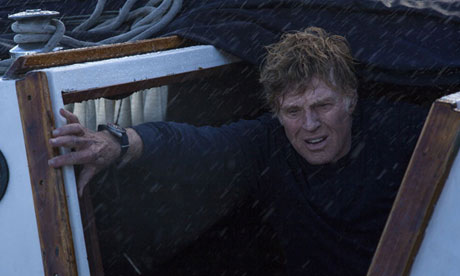Title: All Is Lost
Lionsgate/ Roadside Attractions
Director: J.C. Chandor
Screenwriter: J.C. Chandor
Cast: Robert Redford
Screened at: Park Ave., NYC, 10/9/13
Opens: October 18, 2013
Barbra Streisand is perhaps best known for pronouncing the notion that “People, people who need people, are the luckiest people in the world.” Our Man, which is the only name we know for Robert Redford’s character in J.C. Chandor’s “All is Lost,” is at first a person who does not need people, but in time—in just eight days, in fact– he stands to be the luckiest person in the world if he could find someone, preferably someone with a big ship. “With one person, one very special person, no more hunger and thirst,” concludes Barbra in a song that lyricists Dunbar, Rolie and Schon could have written with Our (hungry and thirsty) Man in mind.
Our Man, a fellow whose backstory remains a mystery to us in the audience, illustrates the writer-director’s breaking with the usual movie conventions in that he makes no effort to teach us anything about the man’s past while at the same time having him exhibit a range of emotions from surprise to fear, from resilience to ingenuity. He could stand in for Everyman, if Everyman, as though thumbing his nose at our crowded planet of seven billion, heads off to the high seas solo, probably with no motivation even to make the Guinness Book of World Records, and so far as we know with no specific purpose at all except to show that the Indian Ocean is to him what Walden Pond was to Thoreau.
In his fairly small yacht, equipped with a stove, potable water, a suitable supply of canned beans, and some primitive fishing equipment to catch whatever the sharks don’t see first, Our Man becomes just slightly alarmed when noting that water is seeping into his small vessel because of a collision with some detritus on the high seas. He pours himself a couple of glasses of bourbon, spoons up some beans, and tries to make do with a large container of potable water. He extends his line only to discover that a sizable fish was seen first by a shark. Believing that all will be well upon his detachment from the metaphoric iceberg, he is dismayed to discover that his vessel has become too crippled for further use, requiring him to change venue to a lifeboat.
As his skin becomes increasingly red, he curses just once with a loud yell, the only thing we hear from him save for an initial narration that takes place in what may be his final day on water: he declaims that all is lost.
“All is Lost” is as minimalist as a movie can be, one which, absent the ocean, would be yet another one-man show like Samuel Beckett’s “Krapp’s Last Tape” that you’d find occasionally in a New York off-off-Broadway theater, but Chandor is even more sparing by giving his lone character just a few words of monologue and a complete absence of dialogue. At 76, Redford is exhibiting his thesp chops as the old man and the sea, looking weathered from both age and circumstance.
More minimalist than Ang Lee’s “Life of Pi,” about a boy alone on a raft in the Pacific but with considerable exposition about his family; and more Spartan than even Robert Zemeckis’s “Cast Away,” which at least gives Chuck Nolan a number of possibilities to develop his island real estate, “All is Lost” is writer-director’s Chandor’s about face from his “Margin Call” with that story’s flurry of chatter and energy. Existentialists hold that we are what we do. We’ll have to settle for considering what Our Man does in his eight desperate days at sea (filmed in Baja California and the Bahamas) to be the sum of his character.
While I’m not as sanguine about this rules-breaking film as some other critics similarly data-based on RottenTomatoes.com, I am suitably impressed about seeing a movie that is not like any other. Originality at a time that film and TV studios resort to the familiar rather than take financial risks is to be cheered. Americans, particularly those of a politically conservative bent, can interpret the story as one glorifying the American individual over the European-style collective, and metaphysicians can look at the whole shebang as an allegory about the losing struggle that all of us make on a headlong slide toward death. Whatever you see in this, you’ll likely agree: watching Robert Redford is watching one of the major icons of the film industry.
Rated PG-13. 107 minutes © 2013 by Harvey Karten, Member, New York Film Critics Online
Story – B-
Acting – A-
Technical – B
Overall – B

